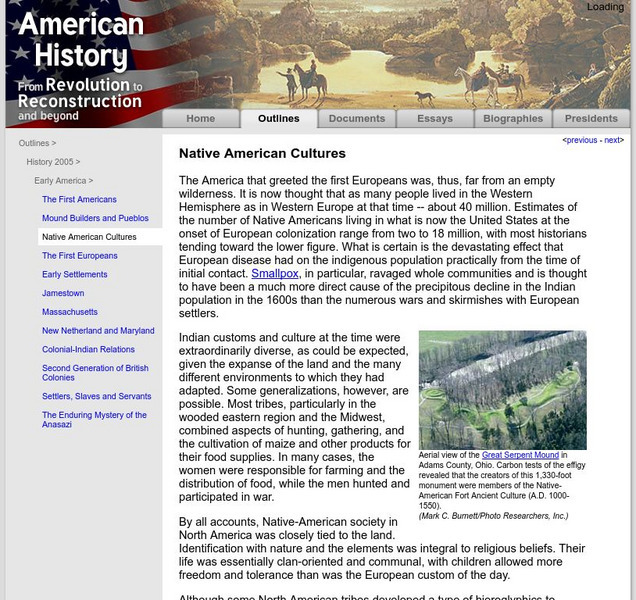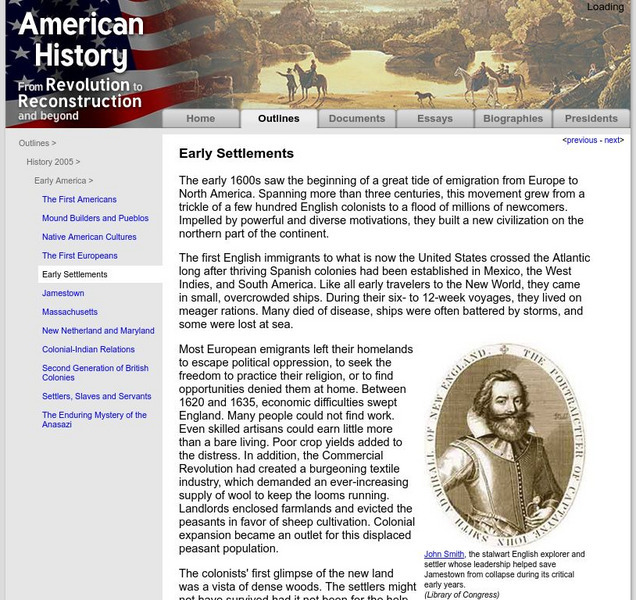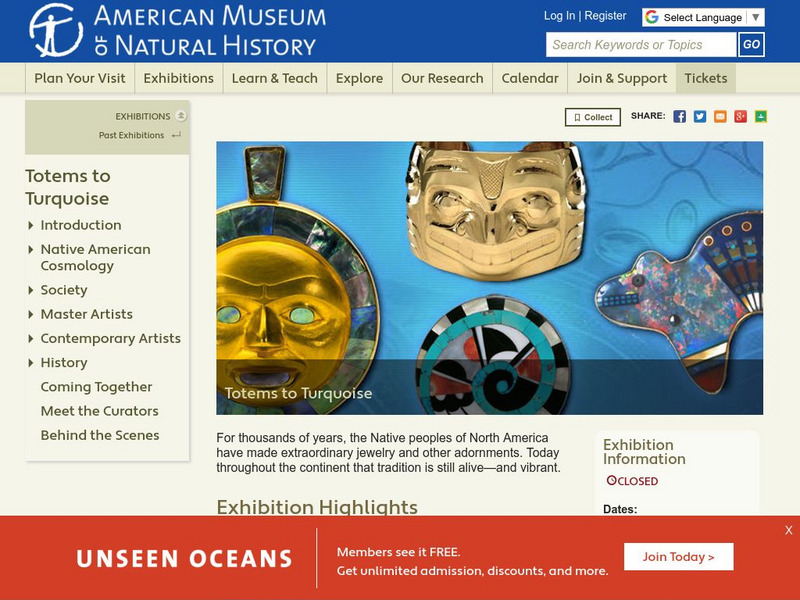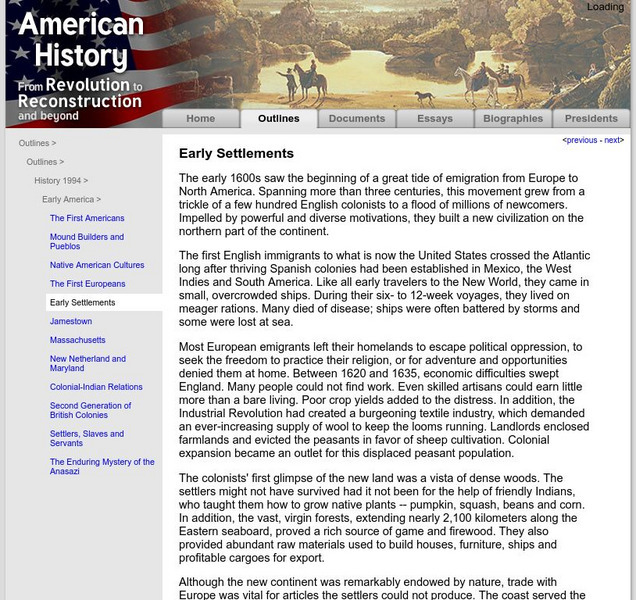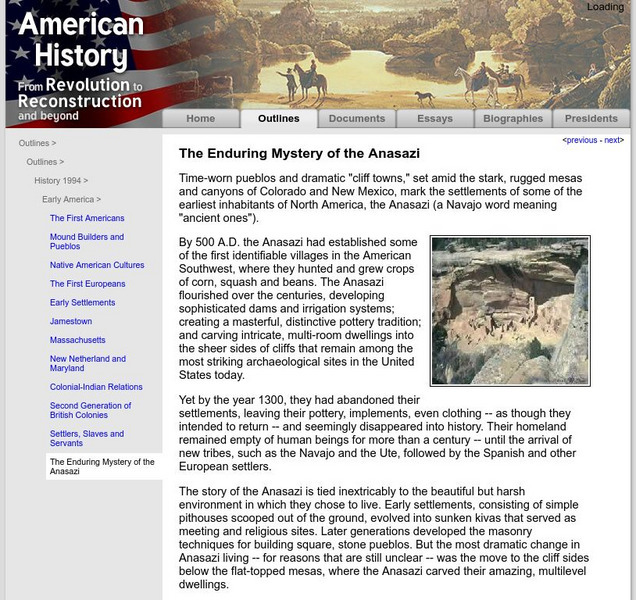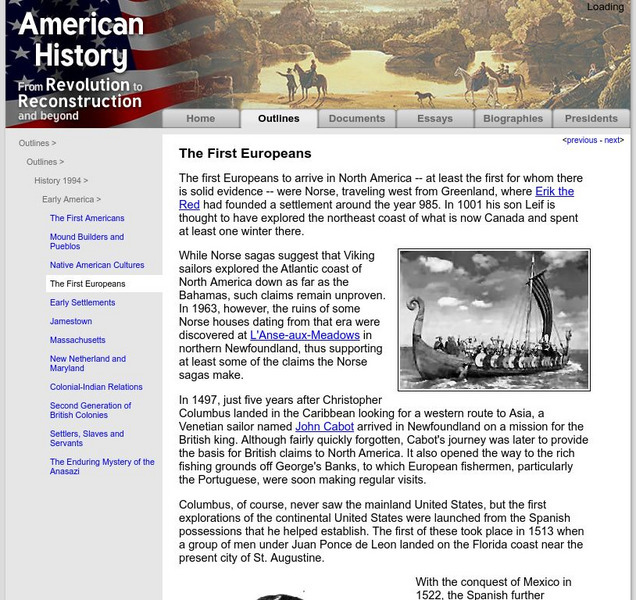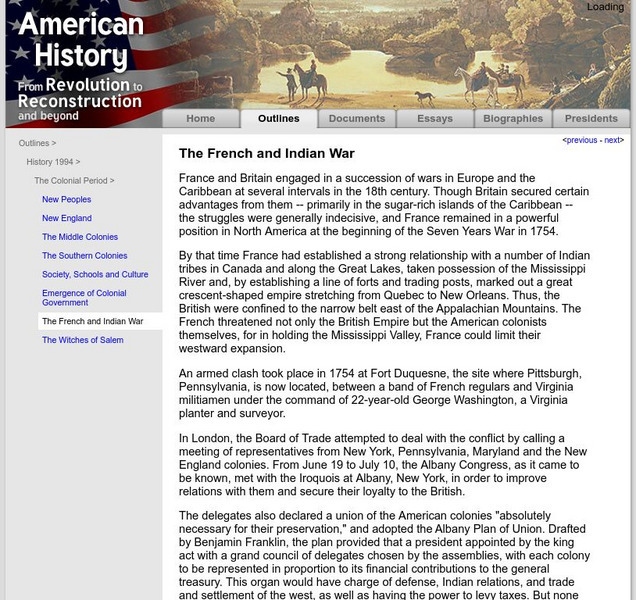Hi, what do you want to do?
Smithsonian Institution
Harvest Ceremony: Beyond the Thanksgiving Myth
There is a grain of truth in myths. Young historians investigate the truths surrounding the popular beliefs about the First Thanksgiving in Plymouth, Massachusetts. After reading the information in a study guide, they use what they...
California Historical Society
Understanding California
Here is a beautiful handout through which learners can explore the history of California, from the earliest Europeans to visit the Golden State up through its experiences during the Great Depression and position in the modern...
New Bedford Whaling Museum
A New Bedford Voyage!
A thorough set of activities, articles, and reference material can enlighten your class about the history of whaling in New England. Kids travel back to a time when whale products were valuable and hunting whales was a way to help the...
University of California
The Civil War: The Road to War
The United States Civil War resulted in the highest mortality rate for Americans since the nation's inception. Delve deeper into the causes for the drastic separation of states with a history lesson plan that features analysis charts,...
Film Education
Glory
If you are previewing the film Glory for your young historians, this packet may help you spark ideas for discussion and offer some interesting facts and quotations that may add to your presentation of this Civil War narrative. It...
University of Groningen
American History: Outlines: Native American Cultures
The America that greeted the first Europeans was, thus, far from an empty wilderness. It is now thought that as many people lived in the Western Hemisphere as in Western Europe at that time -- about 40 million. Estimates of the number of...
CommonLit
Common Lit: Text Sets: Native American History
This is a collection of 27 Grade-Leveled texts (4-12) on the topic Native American History. Before European settlers came to North America, millions of native people lived in many unique societies. Explore the history of Native Americans...
Stephen Byrne
History for Kids: North American History
History reference page for elementary students provides an overview of early American history from the age of Columbus through the Civil War and abolition of slavery. Includes links to teacher resources.
University of Groningen
American History: Outlines: Early Settlements
The early 1600s saw the beginning of a great tide of emigration from Europe to North America. Spanning more than three centuries, this movement grew from a trickle of a few hundred English colonists to a flood of millions of newcomers....
University of Groningen
American History: Outlines: The Enduring Mystery of the Anasazi
Time-worn pueblos and dramatic cliff towns, set amid the stark, rugged mesas and canyons of Colorado and New Mexico, mark the settlements of some of the earliest inhabitants of North America, the Anasazi (a Navajo word meaning "ancient...
University of Groningen
American History: Outlines: The First Europeans
The first Europeans to arrive in North America -- at least the first for whom there is solid evidence -- were Norse, traveling west from Greenland, where Erik the Red had founded a settlement around the year 985. In 1001 his son Leif is...
University of Groningen
American History: Outlines: Jamestown
The first of the British colonies to take hold in North America was Jamestown. On the basis of a charter which King James I granted to the Virginia (or London) company, a group of about 100 men set out for the Chesapeake Bay in 1607....
University of Groningen
American History: Outlines: New Netherland and Maryland
Hired by the Dutch East India Company, Henry Hudson in 1609 explored the area around what is now New York City and the river that bears his name, to a point probably north of present-day Albany, New York. Subsequent Dutch voyages laid...
Library of Congress
Loc: Primary Documents in American History: Treaty of Ghent
This web page from the U.S. Library of Congress includes a brief bibliographic record and a link to a digital copy of the original. The Treaty of Ghent was negotiated in Belgium and it ended hostilities between the United States and...
Smithsonian Institution
National Museum of Natural History: American Mammals: Hog Nosed Skunk
The Smithsonian Museum of Natural History, in a section titled "North American Mammals," offers a general overview of the North American hog-nosed skunk. Additional content includes detailed drawings, photographs, and a map showing the...
American Museum of Natural History
American Museum of Natural History: Totems to Turquoise: Native American Jewelry
Through this resource, the user can learn about the hand-crafted jewelry of Native North Americans of the Northwest and Southwest and how it embodies both the personal and collective identity of the maker and the wearer.
University of Groningen
American History: Biographies: Lord North (1713 1792)
Lord North was Prime Minister of Great Britain from January, 1770 to March, 1782. His early successes as Leader of the House and his efforts to cut the national debt brought him the confidence of a faction-ridden Parliament and the favor...
University of Groningen
American History: Outlines: Early Settlements
The early 1600s saw the beginning of a great tide of emigration from Europe to North America. Spanning more than three centuries, this movement grew from a trickle of a few hundred English colonists to a flood of millions of newcomers....
University of Groningen
American History: Outlines: The Enduring Mystery of the Anasazi
Time-worn pueblos and dramatic "cliff towns," set amid the stark, rugged mesas and canyons of Colorado and New Mexico, mark the settlements of some of the earliest inhabitants of North America, the Anasazi (a Navajo word meaning "ancient...
University of Groningen
American History: Outlines: The First Europeans
The first Europeans to arrive in North America -- at least the first for whom there is solid evidence -- were Norse, traveling west from Greenland, where Erik the Red had founded a settlement around the year 985. In 1001 his son Leif is...
University of Groningen
American History: Outlines: Colonial Economy
Whatever early colonial prosperity there was resulted from trapping and trading in furs. In addition, the fishing industry was a primary source of wealth in Massachusetts. But throughout the colonies, people relied primarily on small...
University of Groningen
American History: Outlines: Southern Colonies
In contrast to New England and the middle colonies were the predominantly rural southern settlements: Virginia, Maryland, North and South Carolina, and Georgia.
University of Groningen
American History: Outlines: The French and Indian War
France and Britain engaged in a succession of wars in Europe and the Caribbean at several intervals in the 18th century. Though Britain secured certain advantages from them -- primarily in the sugar-rich islands of the Caribbean -- the...
World Atlas
World Atlas: North America
Features maps and a description of the geography and history of North America with links to information on its countries, famous people, flags, symbols, and much more.










